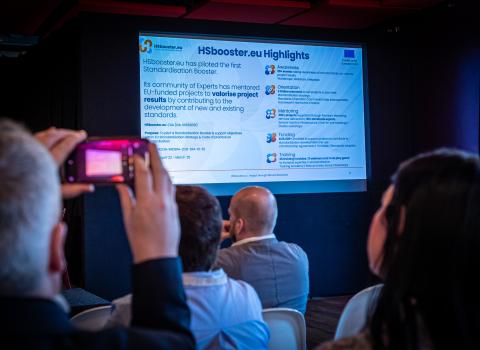Speaking at the launch of the first tranche of Horizon 2020 calls on December 11, EU Commissioner for Research and Innovation, Máire Geoghegan-Quinn, said there is good news for businesses big and small, but the biggest boost is for small and medium-sized enterprises (SMEs), which will benefit from simplification, a shorter time to grant, improved access to risk finance, as well as a new dedicated instrument, which kicks off with €500 million in the first two years.
The new SME instrument, which will be integrated across the societal challenges and industrial leadership topics in Horizon 2020, will find its home in the “Innovation in SMEs” programme. This programme will also provide funding for Eurostars, the pan-European programme for international collaboration between research-intensive SMEs, as well as various actions aiming at developing and providing better innovation support services to SMEs.
Another first under Horizon 2020 is the possibility for small companies to apply for EU funding on their own bat, rather than as part of a consortium as under Framework Programme Seven.
There was a warm response from the sector, with Patrick de Boer, partner at ttopstart, a consultancy representing clients in the life sciences and medical technology sectors, saying, “Our clients widely applaud the new SME instrument. We strongly believe that such tools will accelerate innovation within SMEs.”
An SME instrument
To help simplify the process, a dedicated SME instrument has been created under Horizon 2020 to finance innovative companies. The idea is to let SMEs in all fields of science, technology and innovation apply for funding singly, or in groups.
SMEs are particularly invited to participate in the societal challenges, such as health, energy, transport, as well as the leadership in enabling and industrial technologies programme, including activities in nanotechnologies, ICT and advanced materials. Calls under the SME instrument in 2014 will include €66.1 million for clinical research in the validation of biomarkers and diagnostic medical devices; €33.95 million to stimulate the innovation potential of SMEs for a low carbon and efficient energy system; and €35.87 million for innovation research in transport.
“The SME instrument addresses the financing needs of internationally-oriented SMEs, in implementing high-risk and high-potential innovation ideas,” says the Commission’s work programme.
The programme consists of three separate phases, along with coaching and mentoring services.
It begins with funding for technical feasibility and economic viability studies (duration approximately six months; funding of €50,000), and continues to a second stage of funding for development, prototyping and other demonstration work (duration 12-24 months; funding of between €0.5million and €2.5 million). In the final phase of commercialisation, the Commission will not directly fund work, but will connect SMEs to other programmes that could provide the funding. This includes access to the financial facilities supported by Horizon 2020, as well as various other support measures, for example on intellectual property protection.
Innovation support
One of the calls launched yesterday, ‘Enhancing SME innovation by providing better innovation support’, will receive €9.58 million in 2014 to develop an ecosystem of innovation support for small business across Europe. Actions under this call include the further development of the European Intellectual Property Rights Helpdesk, peer learning activities for national and regional agencies, and research to capitalise on the potential of online-collaboration.
The Commission sees this as a necessary add-on to the public support already given to SMEs through grants, subsidised loans, and equity, saying, “SMEs receiving innovation support often remain dissatisfied with the services they receive while the public expects a higher return from the support provided.” But de Boer disagrees, saying, “We do not see the immediate need for these networks and platforms, since SMEs have an intrinsic motivation to find the service and support that is best suited to them.”
In another action, €5 million from Horizon 2020’s 2014 budget will be spent on establishing services to enhance the innovation management capacity of SMEs, in an attempt to address the imbalance in quality, price and availability of consulting services offers available to SMEs across Europe.
Internationalisation of SMEs
The programme will place a strong emphasis on the need for Europe’s SMEs to take advantage of the growing opportunities available in external markets, and in international collaboration. “Radical innovations” are possible “by collaborating with partners from different economic, scientific and socio-cultural backgrounds,” said the Commission.
An international conference will be held in 2014 to start a discussion in this area and to study the internationalisation of European SMEs to date.





 A unique international forum for public research organisations and companies to connect their external engagement with strategic interests around their R&D system.
A unique international forum for public research organisations and companies to connect their external engagement with strategic interests around their R&D system.